- About Us
- Columns
- Letters
- Cartoons
- The Udder Limits
- Archives
- Ezy Reading Archive
- 2024 Cud Archives
- 2023 Cud Archives
- 2022 Cud Archives
- 2021 Cud Archives
- 2020 Cud Archives
- 2015-2019
- 2010-2014
- 2004-2009
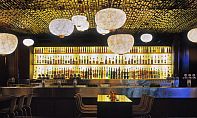 |
Dude, Where’s My Pub? |
To learn the sad story of the demise of Sydney’s once fine drinking establishments, walk into a pub and look down. Well, to read the epilogue anyway. The prologue and chapters, the meat of the tale has been stripped away and thrown into landfill. 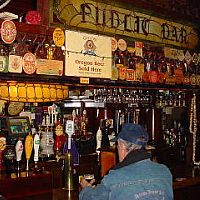 In any of these “bars” you’ll find that where once lay a carpet with a mature aroma and a host of memories — spilt rum here, dried blood there, a thousand dropped cigarettes — there now lies polished wood with a simple message of mediocrity and money, tip tap tapped in Braille by sharp stilettos.
In any of these “bars” you’ll find that where once lay a carpet with a mature aroma and a host of memories — spilt rum here, dried blood there, a thousand dropped cigarettes — there now lies polished wood with a simple message of mediocrity and money, tip tap tapped in Braille by sharp stilettos.
Somewhere in the mid-nineties, the character of Sydney’s drinking areas started to change in earnest. The housing boom was gathering steam, driven by the impending Olympics and what has now become a generation-long economic boom. The upstanding seedy folk of Surry Hills, Balmain, and the Inner-West who had long contributed so much to the atmosphere of these areas were beginning to be priced out of their own suburbs; driven out by a wave of invaders in sports cars and four wheel drives. These ridiculous vehicles can be seen today cramming the tiny streets of urban areas, while their owners can be seen cursing and muttering as they vainly try to find somewhere to park. Really, four-wheel drives in the inner city? I hate to lower the tone of the article but… you fucktards.
And with the fucktards came the pub renovations. And didn’t they just? Acres of light coloured timber and polished steel replaced tiles, the aforementioned carpets, and any sense that the place you were drinking in might have carried a bit of history with it. The most important thing seemed to be that the place was shiny. That and that it could be hosed down at the end of the night without having to pick anything up to wipe under it. One unintended result is shocking acoustics. Noise bounces around the room with no place to go, so the only way to have a conversation is to talk louder, feeding into the cycle and ensuring loud snatches of other people’s unwelcome conversations invade your eardrums; while one’s own drunken ravings are amplified. It became a citywide epidemic that took virtually no prisoners. A few notable pubs held their ground and still do: the Shakespeare, the Townie, erm… Century Tavern? Sorry, recently departed. To list all that fell would be a depressing and lengthy exercise. 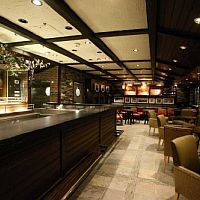 Like the bleached coral of the Great Barrier Reef, it is a desolate landscape.
Like the bleached coral of the Great Barrier Reef, it is a desolate landscape.
And with the change of habitat, came a change of fauna. The abundant and wide varieties of life previously found were wiped out, or migrated to more propitious climes. The old men who were staples of these establishments stuck it out as best they could and tried to make a go of their newly renovated homes away from home. Shortly after the renovation of a certain pub in Devonshire Street, Surry Hills (whose name beginning with O escapes me; O-bar? O-no? O-my god what happened to my pub?), on a weekday morning I witnessed one of the saddest sights to be indelibly printed on my consciousness. A trio of elderly regulars had returned to their drinking hole after a long absence and were sitting on new uncomfortable looking stools appearing confused and dejected, their dignity all but stripped from them. They’d ordered their first round of Reschs at the now chrome bar and been served them in shmiddies - those unholy bastard offspring of schooners and middies that sum up this whole sorry mess in a glass. Less content, a ridiculous looking vessel, and all at greater cost.
While only a handful of species could adapt to the tectonic shift, two did indeed thrive and have now successfully replaced most other genuses. These can be found in large numbers on any given Friday or Saturday night flocking to the bright lights and loud noises, looking for carbon copies of themselves to watch in the mirror as they arrhythmically copulate to the strains of Buena Vista Social Club. The males can be identified by their almost-Mohawks, too tight shirts, pastel coloured clothes, trucker hats and white belts highlighting healthy smiles over talk of real estate and rugby (league and otherwise). The females are the glammed up shiny ladies with massive sunglasses, sizing up the possible socio-economic benefits of hooking up with a metrosexual male. Or if it’s getting late (biologically speaking), preying on any members of the herd too slow moving or slow witted to get themselves out of harm’s way.
The Clock in Surry Hills is a most tragic case in point. 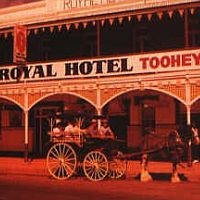 When I was fifteen the bouncers would let me in with the ID of a friend (not Bryan Magee) who I bore no resemblance to whatsoever, who often had his other ID checked alongside me. Never mind that the age on each license was not quite 18 either. The bouncer wasn’t that smart, bless him.
When I was fifteen the bouncers would let me in with the ID of a friend (not Bryan Magee) who I bore no resemblance to whatsoever, who often had his other ID checked alongside me. Never mind that the age on each license was not quite 18 either. The bouncer wasn’t that smart, bless him.
Once inside I would often fall under the obligation-free protection of a drunken, rough as guts ex-gaolbird who feared for my 12-year-old looking face. He would be at the bar with his girlfriend who would guarantee him a “root” if he successfully skulled his beer, which he invariably did. Then she’d look into my eyes wide with wonder and say “There. He's got a root now”. Looking around the room I would frequently see members of MassAppeal, The Hard-Ons and plenty of other legendary indie bands drinking at the bar alongside dealers who kept their stashes in the floor ashtrays, next to their dogs.
The jukebox was packed with awesome tunes you’d be lucky to hear on JJJ let alone commercial radio, a far cry from the tripe that is piped in to the place today. I can’t remember if there was a television on the wall, but if there was it certainly wasn’t a feature of the place. There was a bistro serving a wide variety of excellent four dollar meals by waitresses who'd been on a vinegar drip since birth and would tell you in no uncertain terms what you could do with yourself if you dared question them. About anything. Including the menu.
A big room of pool tables sat out the back while all sorts of paraphernalia (foreign currencies, Star Wars figures, pictures of a sponsored local footy team, someone’s false teeth etc.) adorned the wall behind the bar. On a Saturday night you'd see a big line of Harleys out the front that nobody dared touch.
The Clock was, in short, a pub with character, characters, and an excellent vibe.
Then one day I made my way up to Crown Street and noticed only one wall of the pub was standing. The others had been torn down and renovations had commenced. Reflecting my naivety, I hoped they 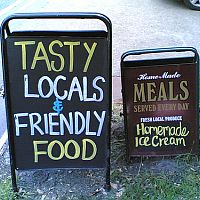 would make the place even better than it was before. Or at the least retain some of its former gutter brilliance. Of course that didn’t happen and instead they converted it into a gleaming, polished pile of mediocrity. Complete with a cafe that sells sports cars and four wheel drives.
would make the place even better than it was before. Or at the least retain some of its former gutter brilliance. Of course that didn’t happen and instead they converted it into a gleaming, polished pile of mediocrity. Complete with a cafe that sells sports cars and four wheel drives.
It’s hard to find a silver lining to the dark cloud of unimaginative wholesale pub transformations in fair old Sydney, the rip-tear town. Some publicans have experienced net negatives after renovating, but the schadenfreude of seeing a pub devoid of patrons — the old regulars who were ejected and the new young punters that failed to materialize — is cold comfort to anyone who has had a genuine attachment to a favoured watering hole. Even some RSL clubs are now ripping out the comfortable old décor and replacing it with fancy panels and mirrors. If there is an upside to all this, it is that the few remaining seedy pubs are attracting more of us refugees whose alcohol intake has increased through despair, thus sales are higher and hopefully the publicans will resist the temptation to fix that which is not broken. If they do we may witness the rise of the new speakeasy – garages, warehouses and basements converted into dive bars for those who can do without catching their reflection in every surface.
